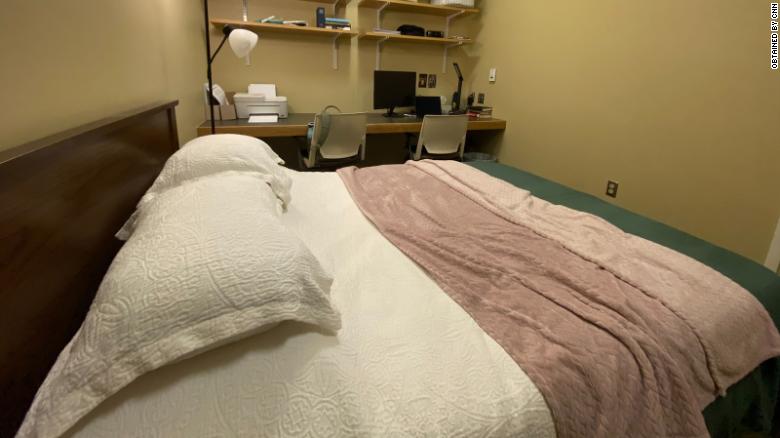New York (Trends Wide) – Billionaire Charlie Munger’s controversial plans to build a huge windowless dorm at the University of California at Santa Barbara (UCSB) have many wondering: how is it possible?
The answer lies at the University of Michigan, where the Munger Graduate Residence houses more than 600 graduate students in 6- to 7-room apartments. And most of those single rooms don’t have windows either.
The graduate student in public policy Luiza Macedo did not see the sun for a whole week when she had to isolate herself in her room at the Munger Residence due to a COVID-19 scare.

A windowless bedroom at the Munger Residence in Michigan.
“That was probably the lowest point of my experience here. Being locked in my bedroom,” Macedo said. “A lot of people are incredulous that this was happening before all these articles about UCSB came out … like, how is this legal? How are they doing this to us?”
Many students use sunlamps or night lights to create an artificial feeling in the daytime – students told Trends Wide Business that it is almost impossible to get by without one.
Munger, 97, is Warren Buffett’s right-hand man and an amateur architect. He has no formal education in the field.
He graduated from the University of Michigan and used most of his $ 110 million gift to fund his $ 185 million bedroom vision. At the time, in 2013, it was the largest donation the school had ever received. Michigan touted the building as a “community of scholars,” where graduate students from different disciplines constantly interact with each other in common areas, where there are windows.
His controversial plans for Munger Hall at UCSB, an 11-story building that would offer nearly 4,500 windowless beds for graduate students, led a consulting architect to resign in October. Munger donated $ 200 million to UCSB to fund the dormitories, on the condition that his designs be followed.
“When an ignorant leaves, I consider it an advantage, not a disadvantage,” Munger said of the consulting architect in an interview with Trends Wide Business on Monday. “He is simply wrong.”
Munger says his designs create positive experiences for students.
“I was (at the University of Michigan) last month, you never saw a happier group of students and it has a very similar design,” Munger said. “So all I can say is that I’ve been doing this for a long time and no buildings have failed yet.”
Unlike in Michigan, UCSB rooms would have artificial windows designed to mimic the fake portholes of Disney cruise ships.
“It was a mistake on my part not to put these artificial windows in Michigan,” Munger said in an interview with Trends Wide Business on Monday.
Macedo doesn’t spend much time in his room, which costs him about $ 1,000 a month. Instead, he studies facing the top-floor windows, but it’s not because he wants to collaborate with anyone.
“Mental health far outweighs the desire for people to collaborate or whatever goal it is,” says Macedo. “I’d rather not have depression than collaborate with my colleagues.”
Some students are used to living without a window in their room.
“I wasn’t sure what it was going to be like to live in a bedroom without a window, but for me, at least, it’s not really a big deal,” said graduate student Sabrina Ivanenco. “I think once you get out of your bedroom, you have a really nice living space.”
In fact, the building is rated 8.8 out of 10 on veryapt.com. Critics praise the amenities, such as study rooms and a gym. And each room has a double-size bed and its own bathroom, with a common space that has a large kitchen, living room, dining room and natural light. However, many also complain about the lack of windows.
Lindsay Stefanski, deputy director of graduate academic initiatives, said Munger has multiple community-building events, like rooftop yoga, to promote wellness. The dorm has partnered with the college’s counseling and psychology department to provide SAD lamps, which emulate sunlight.
“The response has been phenomenal,” Stefanski said. “Students appreciate those opportunities to come out of their silos and connect in those larger common spaces.”
UCSB said in a statement Friday that the project and design of the building will go ahead as planned.
Munger also designed a college residence at Stanford University and a library with removable walls at Harvard-Westlake School in Los Angeles. But he has no plans to take his dorm designs to other universities.
“No, I will not. I am willing to die shortly,” he said. “But I do expect this dormitory to be copied four more times on the UCSB campus and many more times on the other campuses in the UC system and I hope this spreads across the country. It’s a better scam.”
Louise Batta, a PhD student, disagrees. She was not aware that her room would have no windows: she said there were no photos on the website and that due to the COVID, she was unable to visit her in person previously. Batta said he immediately started having headaches from the ventilation problems.
“It has completely altered my circadian rhythm. It’s hard to get up in the morning to get out of bed because I never know what time it is,” Batta said. “I know people joke all the time about how bad the housing situation is, but it really has had a negative impact on my graduate school experience.”
Batta is trying to break his rental agreement.
“I haven’t heard any birds since I got here because I don’t have a window. I can’t wake up to the birds,” Batta said.



